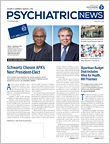Hurricane Maria hit Puerto Rico hard on September 20, 2017. As of press time, the death toll was 64, with another possible 1,054 dead from post-hurricane effects and an inadequate postdisaster response. Access to mental health care was difficult before the hurricane and became even more so afterward.
We are part of a group called Crear Con Salud, composed of Puerto Rican psychiatrists practicing or training in the United States. This nonprofit organization began in 2015 with the goal of improving mental health education and awareness in Puerto Rico. Our members started visiting within the first few weeks after the hurricane to assess community needs. As part of Crear Con Salud, we traveled to Puerto Rico during Thanksgiving week to follow up on several communities that other members had previously visited.
The Bantiox Clinic (the word “b’antiox” is “thank you” from the Mayan language Quichȳ) is a community clinic run by the local organization Iniciativa Comunitaria in response to the dire need for medical services that Hurricane María created. They set up the clinic in the town of Toa Baja nine days after the hurricane hit, relying on volunteers and donations. During our visit, we encountered an organized and well-run clinic mostly staffed by volunteers.
There were no psychiatrists or psychologists there during Thanksgiving week; we were able to use a co-located care model with PHQ-2 screenings on everyone who was triaged, followed by a full assessment when indicated. During these evaluations, we got a clearer picture of the effects of the relentless winds and rain brought by the hurricane. One of the residents needed electricity to supply oxygen for her husband, and after a week without it, he passed away in the middle of the night. Another developed uncontrollable episodes of crying when thinking about the flooding that destroyed her house, and with sadness she said: “Puerto Rico se levanta, dicen, pero yo me quedȳ atrás” (“Puerto Rico rises, they say, but I was left behind”).
A crucial component of the Bantiox Clinic’s services is home visits, a testament to the workers’ dedication toward the community they serve. One of us (Dr. Torres Llenza) accompanied a group to see a family of three whose home was now roofless and needed a tarp. What used to be an area of abundant vegetation looked as though a giant lawn mower had passed through it. Houses that used to be obscured by green foliage were now visible through brown skeletons of bushes and trees. The group visited a woman with her grandmother and daughter sleeping on cots at a friend’s house. The woman felt she had overstepped her stay, and when asked how she was doing, she burst into tears. She was having a difficult time tending to the needs of her family while postponing her own medical and emotional needs. The team listened to her concerns, inquired about her strengths, and developed a plan to return with community members to help set up a tarp. After distributing potable water, adult diapers, and warm hugs, the team returned to the clinic with plans to follow up.
These stories reflect the period of uncertainty, fear, and loss that occurred in the aftermath of the hurricane. Woven within these themes, however, is hope. The Bantiox Clinic’s work is imbued with solidarity, compassion, and commitment. Crear Con Salud will continue supporting the island’s recovery by coordinating donations and giving a series of workshops for community leaders to promote well-being and avoid burnout. We give “b’antiox” for this experience and will continue our mission to strengthen Puerto Rico’s mental health services and task force. ■
Through its new disaster relief fund, the APA Foundation donated $3,000 from APA members and staff to Crear Con Salud. More information about the fund can be accessed
here.

